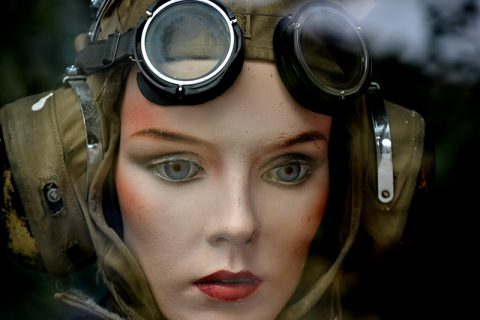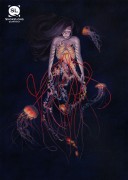First of all, let me say how much I enjoyed reading this. It probably comes as no surprise that the first thing I wondered about was the title, given so much of the story is about naming that nonexistent thing. The story, however, does exist, and I wonder how the title came about.
I had originally titled this “Baby Names” (pretty straightforward and reasonable). Tara Laskowski wanted something more complex. This was the most difficult part. I suggested something from Bishop’s “One Art.”
I’m happy we landed on “Consequence” because I wonder a lot about the consequences of a lost, unborn child. Pro-life supporters view an abortion of such a life as murder. But I feel like women who miscarry or have stillbirths are not allowed to give that loss that same sort of weight (and as someone who is staunchly pro-choice, I see even more starkly the contradiction here). If I were pregnant and lost one, I don’t think my job would give me bereavement time off. Naming, instead of being one of the first acts of consequence for the child, is the final act of consequence.
The title suggests punishment as well as results. How do you see the elements of the narrator’s childhood (fantasy and religion) or her actions while pregnant (eating clementines) connecting to the consequence? Is there a relationship at all?
I’ve been thinking a lot about how parents start spinning narratives for their children, usually before they are even born. This must be, I’ve decided, why parents-to-be are rabid to find out the assigned gender of their child (because let’s remember—you never know the gender of a human until that human tells you as much). For me, this fantasy always revolves around trying to recreate the best moments of my childhood and absolve the worst parts. But a lot of this totally disappears when the child’s future is just the name. The parent gets a chance to be totally indulgent. Or rather, that’s how this speaker is trying to see it. A lot of these favorite things were pulled from my own life. Lucas Leia is a retelling of this joke: a man says to his pregnant wife, “If it’s twins, can we name them Luke and Leia?” and the wife rolls her eyes. Zelda and Ozma from The Legend of Zelda and the Oz series are both badass ladies who hid/are hidden as men. These are not my first picks. I think that’s part of the consequence: that when we have to name a dead child, we might not pick our best names. Those names are for the ones that live.
I love the way pain mixes in with a wry humor in this story. Did you have a vision for the tone of this piece when you started working on it?
I’m glad you think it’s funny, because I do, and that was definitely my intention. I had a pretty stressful time a few years ago; I had many friends who were pretty sick. I gained thirty pounds from stress. (This is relevant.) Through this, my friends and I started making these very dark jokes. I think we might have truly combusted if we hadn’t.
The other sort of background here is that for eight years, I’ve been having dreams about once a month that I’m pregnant or have a child and then miscarry or the child dies. They are very graphic. I wrote an entire chapbook about one dream in which I started bleeding in a birch forest and started screaming, “Alison Dubai, I’m so sorry.” Once, I dreamt that I was pregnant with twins and had to give birth to one. And they placed the child on my stomach in a gallon Ziploc bag, and its neck was snapped, and it didn’t have skull over the crown of its exposed brain. I kept screaming, “Where’s Kenny [my husband]? What do I do with the other one?” I’ve had dreams (plural!) where fetuses bloom in my tea. These dreams are so frequent, though, that they’ve sort of become a joke amongst my friends. I became tired of their horror.
The speaker has found one funny thing. She thinks this is hilarious, because her devastation is so great, she’ll take any smidgen of joy she can grasp.
Often the shorter pieces are harder to write. How long did it take you to finish this?
It was Pregnancy and Infant Loss Remembrance Day when I first drafted this story. One of my best friend’s sisters lost a child, and so they always observe the day. It all fell together quickly. I have gotten very lucky in that a few times in my life I’ve written something and pretty much gotten it right on the first try. This was one of those times, but that’s not the whole story. Admittedly, I’ve been writing poems about dying babies and clementines—they are the only bright thing in winter—for as long as I’ve been having these dreams. This draft maybe took a week to write, but really, I’ve been writing it for eight years.
Peregrine Falcons also happen to be my favorite bird. Can you tell us what it is about these creatures that you like?
This is probably a better question for my husband, Kenny. We’ve had the names picked out for our hypothetical children since we had been dating for six months, except the name of our hypothetical second son.
Then, about seven months ago, he tried to convince me “Peregrine” would be a good name because, “We could call him Pippin like from Lord of the Rings.” Kenny loves birds of prey because he thinks that they are majestic and beautiful, and he loves Peregrine Falcon as a name because of the LOTR. These conversations really influenced the way I thought about this problem of naming a dead child. By letting our imaginations run wild without a child, it let mine explore this story.



 The core workshop of SmokeLong Fitness is all in writing, so you can take part from anywhere at anytime. We are excited about creating a supportive, consistent and structured environment for flash writers to work on their craft in a community. We are thrilled and proud to say that our workshop participants have won, placed, or been listed in every major flash competition. Community works.
The core workshop of SmokeLong Fitness is all in writing, so you can take part from anywhere at anytime. We are excited about creating a supportive, consistent and structured environment for flash writers to work on their craft in a community. We are thrilled and proud to say that our workshop participants have won, placed, or been listed in every major flash competition. Community works.